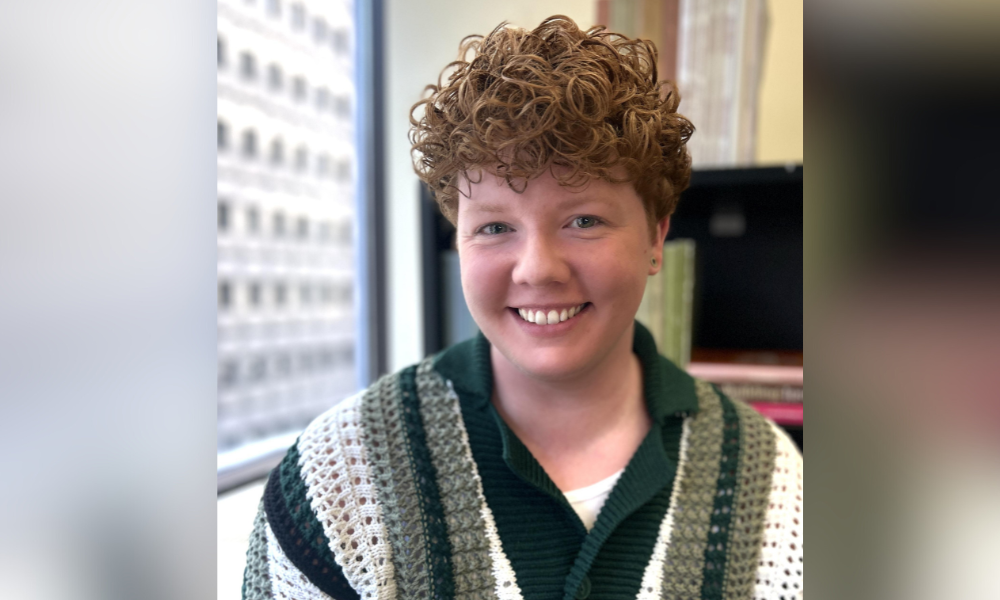
National focus tackles legal setbacks, youth access bans, refugee policy, and prison reform

Aaden Pearson joins the Canadian Civil Liberties Association (CCLA) at a time when the legal terrain for trans rights is being carved with urgency and resistance. As the CCLA’s first-ever trans rights legal fellow, Pearson is not only breaking ground – they are doing so at a moment when backlash and legislative retrenchments are intensifying across Canada.
“The position was created by CCLA in conjunction with a foundation called the Sonor Foundation,” Pearson explains. “They focus on two areas – children in care… and trans and gender diverse communities.” With that dual mandate, the creation of Pearson’s role aims to counter a dangerous trend. “We're seeing a ton of attacks and rollback of rights for trans and gender diverse communities right now,” they say.
In the trenches of Canadian legal advocacy, there has not been a dedicated role like Pearson’s before.
Pearson’s trajectory into this historic role began long before their appointment. Trained as a journalist and drawn to stories that exposed structural inequities, they eventually pivoted to law, seeking not just to tell stories, but to rewrite the ending. “I was doing some freelance work and working for Vice doing a lot of stories… covering rights issues,” Pearson says. “I was feeling a little bit like I wanted to be involved in the issues… maybe just a different way.”
Their path led through high-stakes litigation at a boutique law firm, clerking at the Federal Court of Appeal, and working in law reform at the Law Commission of Canada. But the pivot toward trans advocacy was personal as much as professional. “I helped to start a legal clinic… at the 519,” Pearson shares. “It’s called the Gender Affirming Care Legal Clinic.” This clinic is the first of its kind in Canada, offering pro bono legal advice to trans individuals seeking gender-affirming healthcare and challenging OHIP denials.
That experience, grounded in community and responsive to real-world legal barriers, now informs Pearson’s national advocacy work. Their role at CCLA is broad, encompassing both impact litigation and more systemic work that rarely makes headlines. “We’re involved in all of… the impact litigation in Canada around the trans and gender diverse space,” they say. But their focus stretches further – to trans refugees, children in care, and the link between homelessness and gender diversity.
Pearson is deeply embedded in constitutional challenges across multiple provinces. They say they are working on three significant cases now. “First was New Brunswick… [they] changed the policy to basically say you’re going to be forcibly outed to your parents if you use a different name or pronoun in school.” The CCLA led the constitutional challenge to this policy. Their advocacy contributed to a political shift, with the incoming government reversing course.
They’re also active in Saskatchewan and Alberta, where similar policies and outright bans on youth access to gender-affirming care are in play. The Alberta case targets a sweeping ban on puberty blockers and hormones for anyone under 18. “That case is being brought by Egale [Canada], and we're going to be intervening… to try and give the rights perspective,” Pearson says.
While legal victories are tangible milestones, Pearson knows that much of the real work lies in changing how decision-makers understand the lived experience of trans people. “In part, my goal is to help courts or legislative bodies… just understand these issues better,” they say. “There’s a lot of misinformation, a lot of… misunderstanding.”
Beyond the courtroom, Pearson is pushing to reopen the debate on the Safe Third Country Agreement, which bars refugee claimants from seeking asylum in Canada if they arrive via the United States. They are concerned about the implications for trans refugees. “We’re doing a lot of advocacy around that… trying to get just like correct information out there,” they say. “Maybe a reconsideration of the agreement, maybe a carve out… for trans refugees.”
Their ambitions extend to under-examined spaces, including the incarceration of trans individuals. “There’s a lot of issues… with trans women being incarcerated in male jails,” Pearson says. “I’m starting the preliminary steps of putting together some research report on that.”
These efforts, rooted in law and propelled by lived reality, are all pieces of a larger mission. But for Pearson, the fight is not just about litigation or legislation – it’s about justice and joy. “Despite the government… trying to maybe legislate us out of existence… it’s impossible to do that,” they say. “You can’t actually erase a community.”
What Pearson hopes to shift, especially among legal professionals, is the view that trans people are uncertain, in flux, or incapable of knowing what’s right for them. “They think [trans people] are confused… they don’t know themselves… they’ve been brainwashed,” Pearson says. “I have never encountered somebody like this. Trans people often know themselves very, very well.”
In Pearson’s words, their role isn’t just about reacting to policy – it’s about reimagining the legal infrastructure so that trans rights aren’t a matter of partisan debate, but a constitutional given. In this fellowship, the legal community may find both a reckoning and a roadmap.